One month into his second term, President Trump’s actions to shrink the government through mass layoffs, firings and withholding funds allocated by Congress have thrown federal cybersecurity and consumer protection programs into disarray. At the same time, agencies are battling an ongoing effort by the world’s richest man to wrest control over their networks and data.

Image: Shutterstock. Greg Meland.
The Trump administration has fired at least 130 employees at the federal government’s foremost cybersecurity body — the Cybersecurity and Infrastructure Security Agency (CISA). Those dismissals reportedly included CISA staff dedicated to securing U.S. elections, and fighting misinformation and foreign influence operations.
Earlier this week, technologists with Elon Musk’s Department of Government Efficiency (DOGE) arrived at CISA and gained access to the agency’s email and networked files. Those DOGE staffers include Edward “Big Balls” Coristine, a 19-year-old former denizen of the “Com,” an archipelago of Discord and Telegram chat channels that function as a kind of distributed cybercriminal social network.
The investigative journalist Jacob Silverman writes that Coristine is the grandson of Valery Martynov, a KGB double agent who spied for the United States. Silverman recounted how Martynov’s wife Natalya Martynova moved to the United States with her two children after her husband’s death.
“Her son became a Virginia police officer who sometimes posts comments on blogs about his historically famous father,” Silverman wrote. “Her daughter became a financial professional who married Charles Coristine, the proprietor of LesserEvil, a snack company. Among their children is a 19-year-old young man named Edward Coristine, who currently wields an unknown amount of power and authority over the inner-workings of our federal government.”
Another member of DOGE is Christopher Stanley, formerly senior director for security engineering at X and principal security engineer at Musk’s SpaceX. Stanley, 33, had a brush with celebrity on Twitter in 2015 when he leaked the user database for the DDoS-for-hire service LizardStresser, and soon faced threats of physical violence against his family.
My 2015 story on that leak did not name Stanley, but he exposed himself as the source by posting a video about it on his Youtube channel. A review of domain names registered by Stanley shows he went by the nickname “enKrypt,” and was the former owner of a pirated software and hacking forum called error33[.]net, as well as theC0re, a video game cheating community.
DOGE has been steadily gaining sensitive network access to federal agencies that hold a staggering amount of personal and financial information on Americans, including the Social Security Administration (SSA), the Department of Homeland Security, the Office of Personnel Management (OPM), and the Treasury Department.
Most recently, DOGE has sought broad access to systems at the Internal Revenue Service that contain the personal tax information on millions of Americans, including how much individuals earn and owe, property information, and even details related to child custody agreements. The New York Times reported Friday that the IRS had reached an agreement whereby a single DOGE employee — 25-year-old Gavin Kliger — will be allowed to see only anonymized taxpayer information.
The rapidity with which DOGE has rifled through one federal database after another in the name of unearthing “massive fraud” by government agencies has alarmed many security experts, who warned that DOGE’s actions bypassed essential safeguards and security measures.
“The most alarming aspect isn’t just the access being granted,” wrote Bruce Schneier and Davi Ottenheimer, referring to DOGE as a national cyberattack. “It’s the systematic dismantling of security measures that would detect and prevent misuse—including standard incident response protocols, auditing, and change-tracking mechanisms—by removing the career officials in charge of those security measures and replacing them with inexperienced operators.”
Jacob Williams is a former hacker with the U.S. National Security Agency who now works as managing director of the cybersecurity firm Hunter Labs. Williams kicked a virtual hornet’s nest last week when he posted on LinkedIn that the network incursions by DOGE were “a bigger threat to U.S. federal government information systems than China.”
Williams said while he doesn’t believe anyone at DOGE would intentionally harm the integrity and availability of these systems, it’s widely reported (and not denied) that DOGE introduced code changes into multiple federal IT systems. These code changes, he maintained, are not following the normal process for vetting and review given to federal government IT systems.
“For those thinking ‘I’m glad they aren’t following the normal federal government IT processes, those are too burdensome’ I get where you’re coming from,” Williams wrote. “But another name for ‘red tape’ are ‘controls.’ If you’re comfortable bypassing controls for the advancement of your agenda, I have questions – mostly about whether you do this in your day job too. Please tag your employer letting them know your position when you comment that controls aren’t important (doubly so if you work in cybersecurity). All satire aside, if you’re comfortable abandoning controls for expediency, I implore you to decide where the line is that you won’t cross in that regard.”
The DOGE website’s “wall of receipts” boasts that Musk and his team have saved the federal government more than $55 billion through staff reductions, lease cancellations and terminated contracts. But a team of reporters at The New York Times found the math that could back up those checks is marred with accounting errors, incorrect assumptions, outdated data and other mistakes.
For example, DOGE claimed it saved $8 billion in one contract, when the total amount was actually $8 million, The Times found.
“Some contracts the group claims credit for were double- or triple-counted,” reads a Times story with six bylines. “Another initially contained an error that inflated the totals by billions of dollars. While the DOGE team has surely cut some number of billions of dollars, its slapdash accounting adds to a pattern of recklessness by the group, which has recently gained access to sensitive government payment systems.”
So far, the DOGE website does not inspire confidence: We learned last week that the doge.gov administrators somehow left their database wide open, allowing someone to publish messages that ridiculed the site’s insecurity.
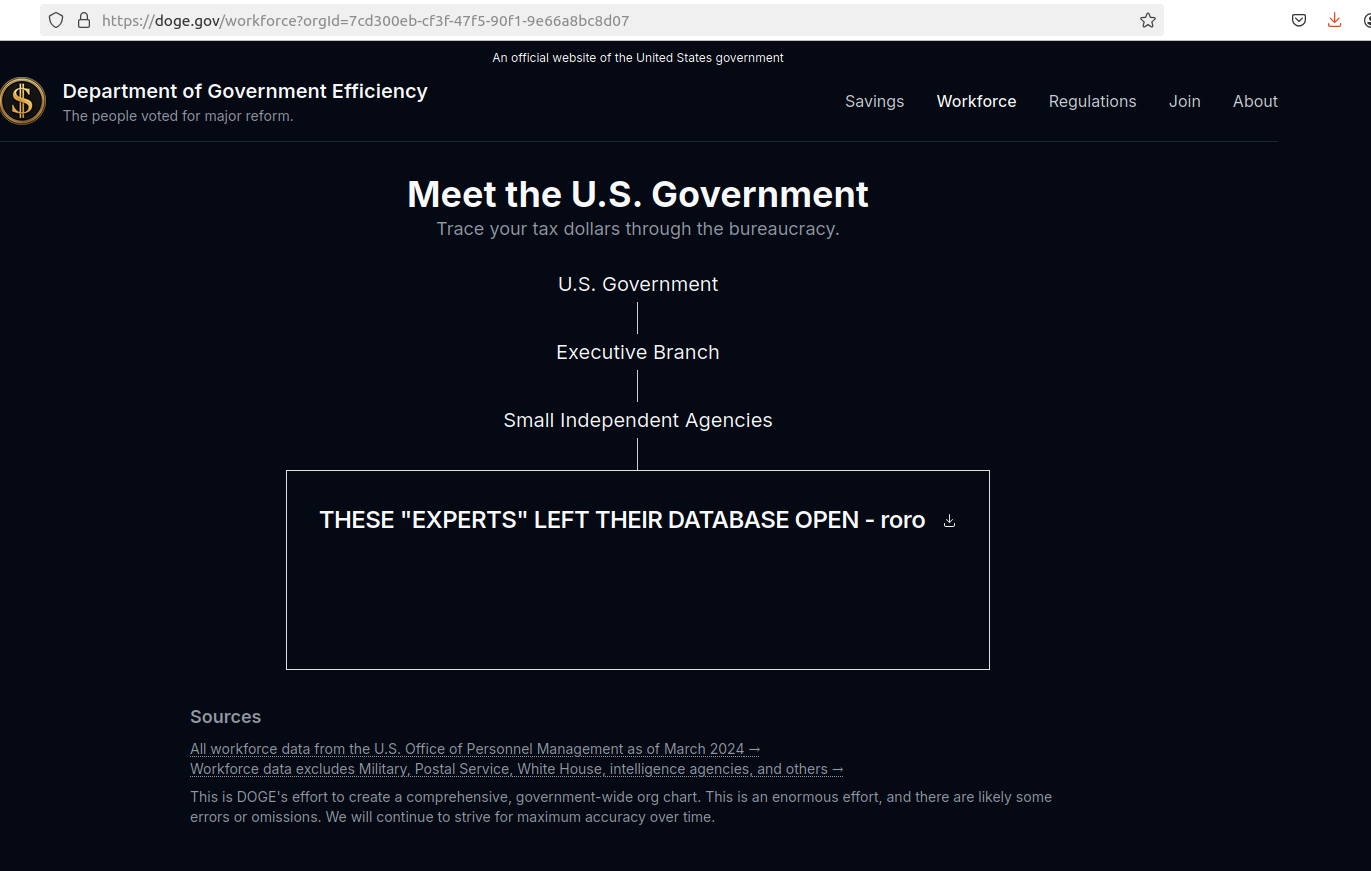
A screenshot of the DOGE website after it was defaced with the message: “These ‘experts’ left their database open – roro”
Trump’s efforts to grab federal agencies by their data has seen him replace career civil servants who refused to allow DOGE access to agency networks. CNN reports that Michelle King, acting commissioner of the Social Security Administration for more than 30 years, was shown the door after she denied DOGE access to sensitive information.
King was replaced by Leland Dudek, formerly a senior advisor in the SSA’s Office of Program Integrity. This week, Dudek posted a now-deleted message on LinkedIn acknowledging he had been placed on administrative leave for cooperating with DOGE.
“I confess,” Dudek wrote. “I bullied agency executives, shared executive contact information, and circumvented the chain of command to connect DOGE with the people who get stuff done. I confess. I asked where the fat was and is in our contracts so we can make the right tough choices.”
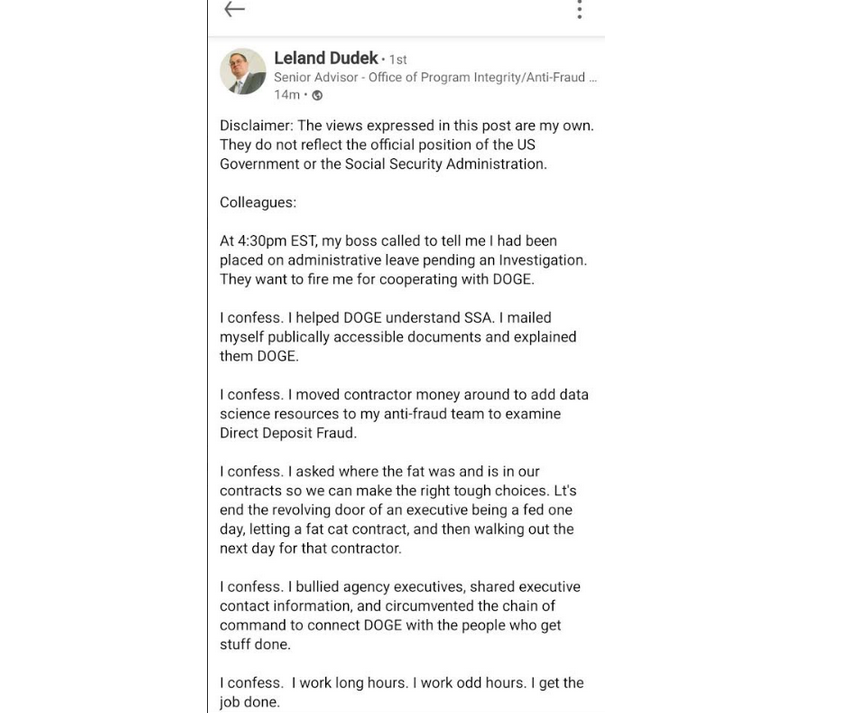
Dudek’s message on LinkedIn.
According to Wired, the National Institute of Standards and Technology (NIST) was also bracing this week for roughly 500 staffers to be fired, which could have serious impacts on NIST’s cybersecurity standards and software vulnerability tracking work.
“And cuts last week at the US Digital Service included the cybersecurity lead for the central Veterans Affairs portal, VA.gov, potentially leaving VA systems and data more vulnerable without someone in his role,” Wired’s Andy Greenberg and Lily Hay Newman wrote.
NextGov reports that Trump named the Department of Defense’s new chief information security officer: Katie Arrington, a former South Carolina state lawmaker who helped steer Pentagon cybersecurity contracting policy before being put on leave amid accusations that she disclosed classified data from a military intelligence agency.
NextGov notes that the National Security Agency suspended her clearance in 2021, although the exact reasons that led to the suspension and her subsequent leave were classified. Arrington argued that the suspension was a politically motivated effort to silence her.
Trump also appointed the former chief operating officer of the Republican National Committee as the new head of the Office of National Cyber Director. Sean Cairncross, who has no formal experience in technology or security, will be responsible for coordinating national cybersecurity policy, advising the president on cyber threats, and ensuring a unified federal response to emerging cyber-risks, Politico writes.
DarkReading reports that Cairncross would share responsibility for advising the president on cyber matters, along with the director of cyber at the White House National Security Council (NSC) — a group that advises the president on all matters security related, and not just cyber.
The president also ordered staffers at the Consumer Financial Protection Bureau (CFPB) to stop most work. Created by Congress in 2011 to be a clearinghouse of consumer complaints, the CFPB has sued some of the nation’s largest financial institutions for violating consumer protection laws.
The CFPB says its actions have put nearly $18 billion back in Americans’ pockets in the form of monetary compensation or canceled debts, and imposed $4 billion in civil money penalties against violators. The CFPB’s homepage has featured a “404: Page not found” error for weeks now.
Trump has appointed Russell Vought, the architect of the conservative policy playbook Project 2025, to be the CFPB’s acting director. Vought has publicly favored abolishing the agency, as has Elon Musk, whose efforts to remake X into a payments platform would otherwise be regulated by the CFPB.
The New York Times recently published a useful graphic showing all of the government staffing changes, including the firing of several top officials, affecting agencies with federal investigations into or regulatory battles with Musk’s companies. Democrats on the House Judiciary Committee also have released a comprehensive account (PDF) of Musk’s various conflicts of interest.
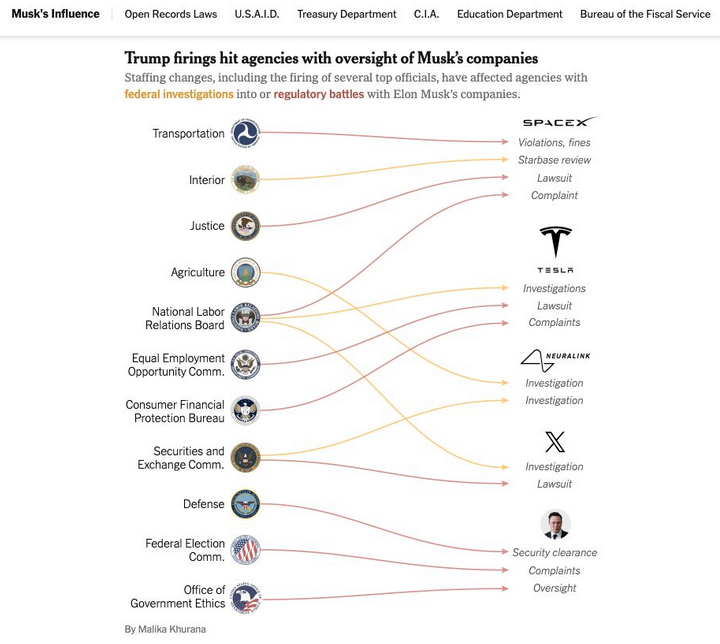
Image: nytimes.com
As the Times notes, Musk and his companies have repeatedly failed to comply with federal reporting protocols aimed at protecting state secrets, and these failures have prompted at least three federal reviews. Those include an inquiry launched last year by the Defense Department’s Office of Inspector General. Four days after taking office, Trump fired the DoD inspector general along with 17 other inspectors general.
The Trump administration also shifted the enforcement priorities of the U.S. Securities and Exchange Commission (SEC) away from prosecuting misconduct in the cryptocurrency sector, reassigning lawyers and renaming the unit to focus more on “cyber and emerging technologies.”
Reuters reports that the former SEC chair Gary Gensler made fighting misconduct in a sector he termed the “wild west” a priority for the agency, targeting not only cryptocurrency fraudsters but also the large firms that facilitate trading such as Coinbase.
On Friday, Coinbase said the SEC planned to withdraw its lawsuit against the crypto exchange. Also on Friday, the cryptocurrency exchange Bybit announced on X that a cybersecurity breach led to the theft of more than $1.4 billion worth of cryptocurrencies — making it the largest crypto heist ever.
On Feb. 10, Trump ordered executive branch agencies to stop enforcing the U.S. Foreign Corrupt Practices Act, which froze foreign bribery investigations, and even allows for “remedial actions” of past enforcement actions deemed “inappropriate.”
Trump’s action also disbanded the Kleptocracy Asset Recovery Initiative and KleptoCapture Task Force — units which proved their value in corruption cases and in seizing the assets of sanctioned Russian oligarchs — and diverted resources away from investigating white-collar crime.
That’s according to the independent Organized Crime and Corruption Reporting Project (OCCRP), an investigative journalism outlet that until very recently was funded in part by the U.S. Agency for International Development (USAID).
The OCCRP lost nearly a third of its funding and was forced to lay off 43 reporters and staff after Trump moved to shutter USAID and freeze its spending. NBC News reports the Trump administration plans to gut the agency and leave fewer than 300 staffers on the job out of the current 8,000 direct hires and contractors.
The Global Investigative Journalism Network wrote this week that the sudden hold on USAID foreign assistance funding has frozen an estimated $268 million in agreed grants for independent media and the free flow of information in more than 30 countries — including several under repressive regimes.
Elon Musk has called USAID “a criminal organization” without evidence, and promoted fringe theories on his social media platform X that the agency operated without oversight and was rife with fraud. Just months before the election, USAID’s Office of Inspector General announced an investigation into USAID’s oversight of Starlink satellite terminals provided to the government of Ukraine.
KrebsOnSecurity this week heard from a trusted source that all outgoing email from USAID now carries a notation of “sensitive but unclassified,” a designation that experts say could make it more difficult for journalists and others to obtain USAID email records under the Freedom of Information Act (FOIA). On Feb. 20, Fedscoop reported also hearing the same thing from multiple sources, noting that the added message cannot be seen by senders until after the email is sent.
On Feb. 18, Trump issued an executive order declaring that only the U.S. attorney general and the president can provide authoritative interpretations of the law for the executive branch, and that this authority extends to independent agencies operating under the executive branch.
Trump is arguing that Article II, Clause 1 of the Constitution vests this power with the president. However, jurist.org writes that Article II does not expressly state the president or any other person in the executive branch has the power to interpret laws.
“The article states that the president is required to ‘take care that the laws be faithfully executed,'” Juris noted. “Jurisdiction to interpret laws and determine constitutionality belongs to the judicial branch under Article III. The framers of the Constitution designed the separation of duties to prevent any single branch of government from becoming too powerful.”
The executive order requires all agencies to submit to “performance standards and management objectives” to be established by the White House Office of Management and Budget, and to report periodically to the president.
Those performance metrics are already being requested: Employees at multiple federal agencies on Saturday reported receiving an email from the Office of Personnel Management ordering them to reply with a set of bullet points justifying their work for the past week.
“Please reply to this email with approx. 5 bullets of what you accomplished last week and cc your manager,” the notice read. “Please do not send any classified information, links, or attachments. Deadline is this Monday at 11:59 p.m. EST.”
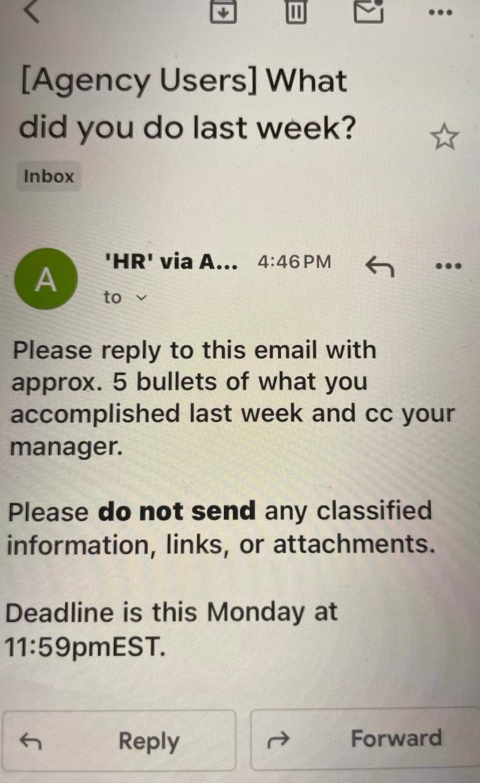
An email sent by the OPM to more than two million federal employees late in the afternoon EST on Saturday, Feb. 22.
In a social media post Saturday, Musk said the directive came at the behest of President Trump, and that failure to respond would be taken as a resignation. Meanwhile, Bloomberg writes the Department of Justice has been urging employees to hold off replying out of concern doing so could trigger ethics violations. The National Treasury Employees Union also is advising its employees not to respond.
A legal battle over Trump’s latest executive order is bound to join more than 70 other lawsuits currently underway to halt the administration’s efforts to massively reduce the size of the federal workforce through layoffs, firings and attrition.
On Feb. 15, the president posted on social media, “He who saves his Country does not violate any Law,” citing a quote often attributed to the French dictator Napoleon Bonaparte. Four days later, Trump referred to himself as “the king” on social media, while the White House nonchalantly posted an illustration of him wearing a crown.
Trump has been publicly musing about running for an unconstitutional third-term in office, a statement that some of his supporters dismiss as Trump just trying to rile his liberal critics. However, just days after Trump began his second term, Rep. Andy Ogles (R-Tenn.) introduced a bill to amend the Constitution so that Trump — and any other future president — can be elected to serve a third term.
This week at the Conservative Political Action Conference (CPAC), Rep. Ogles reportedly led a group of Trump supporters calling itself the “Third Term Project,” which is trying to gain support for the bill from GOP lawmakers. The event featured images of Trump depicted as Caesar.

A banner at the CPAC conference this week in support of The Third Term Project, a group of conservatives trying to gain support for a bill to amend the Constitution and allow Trump to run for a third term.
Russia continues to be among the world’s top exporters of cybercrime, narcotics, money laundering, human trafficking, disinformation, war and death, and yet the Trump administration has suddenly broken with the Western world in normalizing relations with Moscow.
This week President Trump stunned U.S. allies by repeating Kremlin talking points that Ukraine is somehow responsible for Russia’s invasion, and that Ukrainian President Volodymyr Zelensky is a “dictator.” The president repeated these lies even as his administration is demanding that Zelensky give the United States half of his country’s mineral wealth in exchange for a promise that Russia will cease its territorial aggression there.
President Trump’s servility toward an actual dictator — Russian President Vladimir Putin — does not bode well for efforts to improve the cybersecurity of U.S. federal IT networks, or the private sector systems on which the government is largely reliant. In addition, this administration’s baffling moves to alienate, antagonize and sideline our closest allies could make it more difficult for the United States to secure their ongoing cooperation in cybercrime investigations.
It’s also startling how closely DOGE’s approach so far hews to tactics typically employed by ransomware gangs: A group of 20-somethings with names like “Big Balls” shows up on a weekend and gains access to your servers, deletes data, locks out key staff, takes your website down, and prevents you from serving customers.
When the federal executive starts imitating ransomware playbooks against its own agencies while Congress largely gazes on in either bewilderment or amusement, we’re in four-alarm fire territory. At least in theory, one can negotiate with ransomware purveyors.
The FBI’s takedown of the LockBit ransomware group last week came as LockBit was preparing to release sensitive data stolen from government computer systems in Fulton County, Ga. But LockBit is now regrouping, and the gang says it will publish the stolen Fulton County data on March 2 unless paid a ransom. LockBit claims the cache includes documents tied to the county’s ongoing criminal prosecution of former President Trump, but court watchers say teaser documents published by the crime gang suggest a total leak of the Fulton County data could put lives at risk and jeopardize a number of other criminal trials.
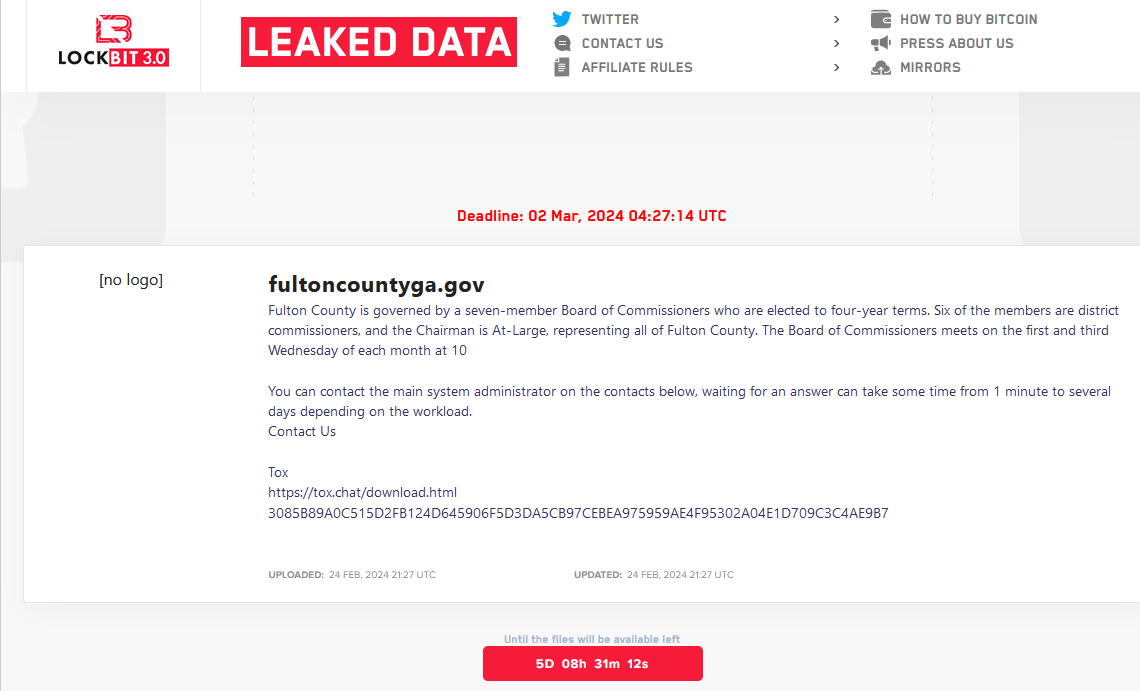
A new LockBit website listing a countdown timer until the promised release of data stolen from Fulton County, Ga.
In early February, Fulton County leaders acknowledged they were responding to an intrusion that caused disruptions for its phone, email and billing systems, as well as a range of county services, including court systems.
On Feb. 13, the LockBit ransomware group posted on its victim shaming blog a new entry for Fulton County, featuring a countdown timer saying the group would publish the data on Feb. 16 unless county leaders agreed to negotiate a ransom.
“We will demonstrate how local structures negligently handled information protection,” LockBit warned. “We will reveal lists of individuals responsible for confidentiality. Documents marked as confidential will be made publicly available. We will show documents related to access to the state citizens’ personal data. We aim to give maximum publicity to this situation; the documents will be of interest to many. Conscientious residents will bring order.”
Yet on Feb. 16, the entry for Fulton County was removed from LockBit’s site without explanation. This usually only happens after the victim in question agrees to pay a ransom demand and/or enters into negotiations with their extortionists.
However, Fulton County Commission Chairman Robb Pitts said the board decided it “could not in good conscience use Fulton County taxpayer funds to make a payment.”
“We did not pay nor did anyone pay on our behalf,” Pitts said at an incident briefing on Feb. 20.
Just hours before that press conference, LockBit’s various websites were seized by the FBI and the U.K.’s National Crime Agency (NCA), which replaced the ransomware group’s homepage with a seizure notice and used the existing design of LockBit’s victim shaming blog to publish press releases about the law enforcement action.
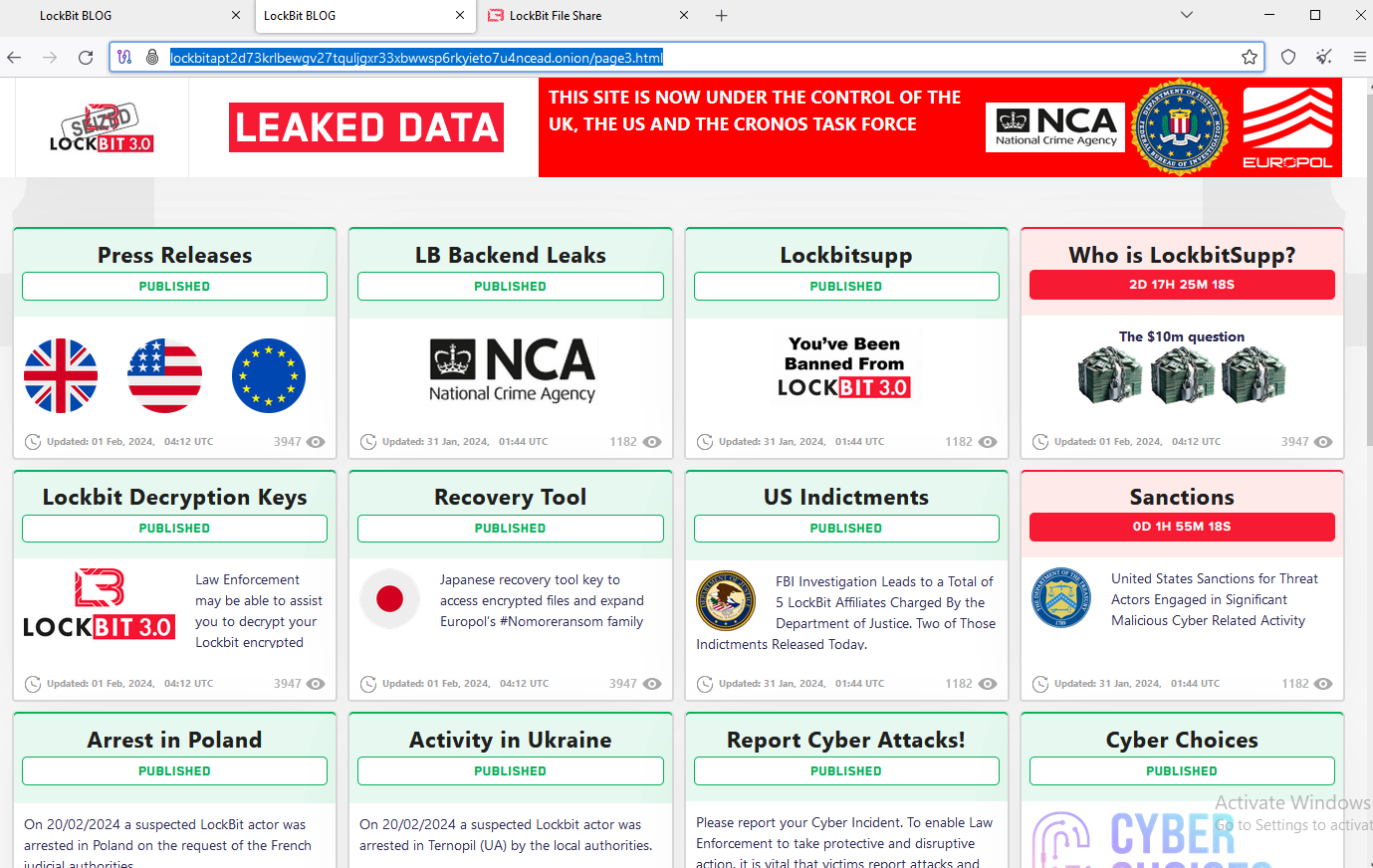
The feds used the existing design on LockBit’s victim shaming website to feature press releases and free decryption tools.
Dubbed “Operation Cronos,” the effort involved the seizure of nearly three-dozen servers; the arrest of two alleged LockBit members; the release of a free LockBit decryption tool; and the freezing of more than 200 cryptocurrency accounts thought to be tied to the gang’s activities. The government says LockBit has claimed more than 2,000 victims worldwide and extorted over $120 million in payments.
In a lengthy, rambling letter published on Feb. 24 and addressed to the FBI, the ransomware group’s leader LockBitSupp announced that their victim shaming websites were once again operational on the dark web, with fresh countdown timers for Fulton County and a half-dozen other recent victims.
“The FBI decided to hack now for one reason only, because they didn’t want to leak information fultoncountyga.gov,” LockBitSupp wrote. “The stolen documents contain a lot of interesting things and Donald Trump’s court cases that could affect the upcoming US election.”
LockBit has already released roughly two dozen files allegedly stolen from Fulton County government systems, although none of them involve Mr. Trump’s criminal trial. But the documents do appear to include court records that are sealed and shielded from public viewing.
George Chidi writes The Atlanta Objective, a Substack publication on crime in Georgia’s capital city. Chidi says the leaked data so far includes a sealed record related to a child abuse case, and a sealed motion in the murder trial of Juwuan Gaston demanding the state turn over confidential informant identities.
Chidi cites reports from a Fulton County employee who said the confidential material includes the identities of jurors serving on the trial of the rapper Jeffery “Young Thug” Williams, who is charged along with five other defendants in a racketeering and gang conspiracy.
“The screenshots suggest that hackers will be able to give any attorney defending a criminal case in the county a starting place to argue that evidence has been tainted or witnesses intimidated, and that the release of confidential information has compromised cases,” Chidi wrote. “Judge Ural Glanville has, I am told by staff, been working feverishly behind the scenes over the last two weeks to manage the unfolding disaster.”
LockBitSupp also denied assertions made by the U.K.’s NCA that LockBit did not delete stolen data as promised when victims agreed to pay a ransom. The accusation is an explosive one because nobody will pay a ransom if they don’t believe the ransomware group will hold up its end of the bargain.
The ransomware group leader also confirmed information first reported here last week, that federal investigators managed to hack LockBit by exploiting a known vulnerability in PHP, a scripting language that is widely used in Web development.
“Due to my personal negligence and irresponsibility I relaxed and did not update PHP in time,” LockBitSupp wrote. “As a result of which access was gained to the two main servers where this version of PHP was installed.”
LockBitSupp’s FBI letter said the group kept copies of its stolen victim data on servers that did not use PHP, and that consequently it was able to retain copies of files stolen from victims. The letter also listed links to multiple new instances of LockBit dark net websites, including the leak page listing Fulton County’s new countdown timer.
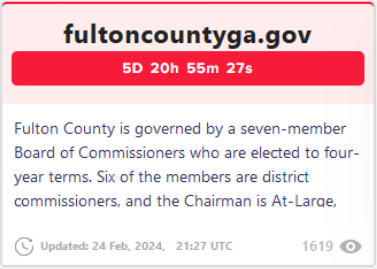
LockBit’s new data leak site promises to release stolen Fulton County data on March 2, 2024, unless paid a ransom demand.
“Even after the FBI hack, the stolen data will be published on the blog, there is no chance of destroying the stolen data without payment,” LockBitSupp wrote. “All FBI actions are aimed at destroying the reputation of my affiliate program, my demoralization, they want me to leave and quit my job, they want to scare me because they can not find and eliminate me, I can not be stopped, you can not even hope, as long as I am alive I will continue to do pentest with postpaid.”
In January 2024, LockBitSupp told XSS forum members he was disappointed the FBI hadn’t offered a reward for his doxing and/or arrest, and that in response he was placing a bounty on his own head — offering $10 million to anyone who could discover his real name.
After the NCA and FBI seized LockBit’s site, the group’s homepage was retrofitted with a blog entry titled, “Who is LockBitSupp? The $10M question.” The teaser made use of LockBit’s own countdown timer, and suggested the real identity of LockBitSupp would soon be revealed.
However, after the countdown timer expired the page was replaced with a taunting message from the feds, but it included no new information about LockBitSupp’s identity.
On Feb. 21, the U.S. Department of State announced rewards totaling up to $15 million for information leading to the arrest and/or conviction of anyone participating in LockBit ransomware attacks. The State Department said $10 million of that is for information on LockBit’s leaders, and up to $5 million is offered for information on affiliates.
In an interview with the malware-focused Twitter/X account Vx-Underground, LockBit staff asserted that authorities had arrested a couple of small-time players in their operation, and that investigators still do not know the real-life identities of the core LockBit members, or that of their leader.
“They assert the FBI / NCA UK / EUROPOL do not know their information,” Vx-Underground wrote. “They state they are willing to double the bounty of $10,000,000. They state they will place a $20,000,000 bounty of their own head if anyone can dox them.”
In the weeks leading up to the FBI/NCA takedown, LockBitSupp became embroiled in a number of high-profile personal and business disputes on the Russian cybercrime forums.
Earlier this year, someone used LockBit ransomware to infect the networks of AN-Security, a venerated 30-year-old security and technology company based in St. Petersburg, Russia. This violated the golden rule for cybercriminals based in Russia and former soviet nations that make up the Commonwealth of Independent States, which is that attacking your own citizens in those countries is the surest way to get arrested and prosecuted by local authorities.
LockBitSupp later claimed the attacker had used a publicly leaked, older version of LockBit to compromise systems at AN-Security, and said the attack was an attempt to smear their reputation by a rival ransomware group known as “Clop.” But the incident no doubt prompted closer inspection of LockBitSupp’s activities by Russian authorities.
Then in early February, the administrator of the Russian-language cybercrime forum XSS said LockBitSupp had threatened to have him killed after the ransomware group leader was banned by the community. LockBitSupp was excommunicated from XSS after he refused to pay an arbitration amount ordered by the forum administrator. That dispute related to a complaint from another forum member who said LockBitSupp recently stiffed him on his promised share of an unusually large ransomware payout.
KrebsOnSecurity sought comment from LockBitSupp at the ToX instant messenger ID listed in his letter to the FBI. LockBitSupp declined to elaborate on the unreleased documents from Fulton County, saying the files will be available for everyone to see in a few days.
LockBitSupp said his team was still negotiating with Fulton County when the FBI seized their servers, which is why the county has been granted a time extension. He also denied threatening to kill the XSS administrator.
“I have not threatened to kill the XSS administrator, he is blatantly lying, this is to cause self-pity and damage my reputation,” LockBitSupp told KrebsOnSecurity. “It is not necessary to kill him to punish him, there are more humane methods and he knows what they are.”
Asked why he was so certain the FBI doesn’t know his real-life identity, LockBitSupp was more precise.
“I’m not sure the FBI doesn’t know who I am,” he said. “I just believe they will never find me.”
It seems unlikely that the FBI’s seizure of LockBit’s infrastructure was somehow an effort to stave off the disclosure of Fulton County’s data, as LockBitSupp maintains. For one thing, Europol said the takedown was the result of a months-long infiltration of the ransomware group.
Also, in reporting on the attack’s disruption to the office of Fulton County District Attorney Fani Willis on Feb. 14, CNN reported that by then the intrusion by LockBit had persisted for nearly two and a half weeks.
Finally, if the NCA and FBI really believed that LockBit never deleted victim data, they had to assume LockBit would still have at least one copy of all their stolen data hidden somewhere safe.
Fulton County is still trying to recover systems and restore services affected by the ransomware attack. “Fulton County continues to make substantial progress in restoring its systems following the recent ransomware incident resulting in service outages,” reads the latest statement from the county on Feb. 22. “Since the start of this incident, our team has been working tirelessly to bring services back up.”
Update, Feb. 29, 3:22 p.m. ET: Just hours after this story ran, LockBit changed its countdown timer for Fulton County saying they had until the morning of Feb. 29 (today) to pay a ransonm demand. When the official deadline neared today, Fulton County’s listing was removed from LockBit’s victim shaming website. Asked about the removal of the listing, LockBit’s leader “LockBitSupp” told KrebsOnSecurity that Fulton County paid a ransom demand. County officials have scheduled a press conference on the ransomware attack at 4:15 p.m. ET today.